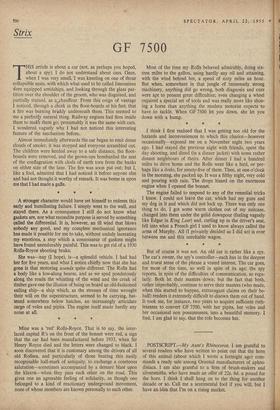Strix
GF 7500
THIS article is about a car (not, as perhaps you hoped, about a spy). I do not understand about cars. Once, when I was very small, 'I was kneeling on one of those collapsible seats, with which what used to be called limousines Were equipped amidships, and looking through the glass par- tition over the shoulder of the groom, who was disguised, and partially trained, as ashauffeur. From this coign of vantage 1 noticed, through a chink in the floor-boards at his feet, that a fire was burning bribkly underneath them. This seemed to me a perfectly natural thing. Railway engines had fires inside them to make them go; presumably it was the same with cars. I wondered vaguely why I had not noticed this interesting feature of the mechanism before.
Almost immediately afterwards the car began to emit dense clouds of smoke; it was stopped and everyone scrambled out. The children were herded away to a safe distance, the floor- boards were removed, and the grown-ups bombarded the scat of the conflagration with clods of earth torn from the banks on either side of the lane. The fire was soon put out; but 1, like a fool, admitted that I had noticed it before anyone else and had not thought it worthy of remark. It was borne in upon me that I had made a gaffe.
A stronger character would have set himself to redeem this early and humiliating failure. I simply went to the wall, and stayed there. As a consequence I still do not know what gaskets are, nor what recondite purpose is served by something called the differential. It is, however, an ill wind that blows nobody any good, and my complete mechanical ignorance has made it possible for me to take, without unduly lacerating my emotions, a step which a. connoisseur of gaskets might have found unendurably painful. This was to get rid of a 1930 Rolls-Royce shooting brake.
She was—nay (I hope), is—a splendid vehicle. I had had her for five years, and what I notice chiefly now that she has gone is that motoring sounds quite different. The Rolls had a body like a low-slung hearse, and as we sped ponderously along the roads the whistling of the wind and the creak of timber gave one the illusion of being on board an old-fashioned sailing ship—a ship which, as the stresses of time wrought their will on the superstructure, seemed to be carrying, bat- tened somewhere below hatches, an increasingly articulate cargo of voles and -pipits. The engine itself made hardly any noise at all.
* * * Most of the time my Rolls behaved admirably, doing six- teen miles to the gallon, using hardly any oil and attaining, with the wind behind her, a speed of sixty miles an hour. But when, somewhere in that jungle of immensely strong machinery, anything did go wrong, both diagnosis and cure were apt to present great difficulties; even changing a wheel required a special set of tools and was really more like shoe- ing a horse than anything the modern motorist expects to have to tackle. When GF 7500 let you down, she let you down with a bump.
* * I think I first realised that I was getting too old for the hazards and inconveniences to which this chariot—however occasionally—exposed me on a November night two years ago. I had stayed the previous night with friends, spent the day shooting, and dined (in a dinner jacket) with some rather distant neighbours of theirs. After dinner I had a hundred miles to drive home and the Rolls went like a bird, or per- haps like a dodo, for ninety-five of them. Then, at one o'clock in the morning, she packed up. It was a filthy night, very cold and pouring with rain. The drops hissed on the enormous engine when I opened the bonnet.
The engine failed to respond to any of the remedial tricks I knew. I could not leave the car, which had my guns and my dog in it And which did not lock up. There was only one thing to do. I got some warm clothes out of my suitcase, changed into them under the gelid downpour (feeling vaguely like Edgar in King Lear) and, curling up in the driver's seat, fell into what a French girl I used to know always called the arms of Murphy. All (I privately decided as I did so) is over between me and this unreliable wagon.
But of course it was not. An old car is rather like a spy. The car's owner, the spy's controller—each has in the deepest and truest sense of the phrase a vested interest, The car goes, for most of the time, so well in spite of its age; the spy reports, in spite of the difficulties of communication, so regu- larly. Both let their masters down; but the fact that both, rather improbably, continue to serve their masters (who made, when this started to happen, extravagant claims on their be- half) renders it extremely difficult to disown them out of hand. It took me, for instance, two years to acquire sufficient ruth- lessness to convert GF 7500, with her pipits, her voles and her occasional non possumusses, into a beautiful memory. I find, I am glad to say, that the role becomes her.
POSTSCRIPT. My Aunt's Rhinoceros. I am grateful to several readers who have written to point out that the horn of this animal (about which I wrote a fortnight ago) com- mands a ready sale among Oriental manufacturers of aphro- disiacs. I am also grateful to a firm of brush-makers and silversmiths, who have made an offer of 22s. 6d. a pound for the horn. I think I shall hang on to the thing for another decade or so. Call me a sentimental fool if you will, but I have an idea that I'm on a rising market.










































 Previous page
Previous page